- Register
- Log in to Tune-In
- Wishlist (0)
-
Shopping cart
(0)
You have no items in your shopping cart.
Beatles News
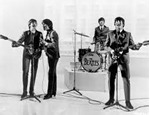
The Beatles‘ “Eleanor Rigby” is one of the Fab Four’s most famous ballads. During the songwriting process, Paul McCartney asked John Lennon and a pair of others to work on the lyrics of the song. John explained why Paul’s actions offended him.John said Paul didn’t directly encourage him to work on “Eleanor Rigby.” “But by that time he didn’t want to ask for my help, and we were sitting around with [The Beatles’ personal assistant] Mal Evans and [music industry executive] Neil Aspinall, so he said to us, ‘Hey, you guys, finish up the lyrics.'” John was incensed by Paul’s actions. “Now I was there with Mal, a telephone installer who was our road manager, and Neil, who was a student accountant, and I was insulted and hurt that Paul had just thrown it out in the air,” he said.
Source: cheatsheet.com
details
George Harrison and Eric Clapton had an interesting relationship. In the early 1970s, Clapton fell in love with George’s first wife, Pattie Boyd. She eventually left the former Beatle and married Clapton. However, this drama did nothing to the pair’s friendship.
While in The Beatles, George envied Clapton’s autonomy, but there was never any competition between them. There might have been if George toured more throughout his career, though.
In 1991, George announced that he was going on a tour of Japan with Clapton. It was his first tour since his first solo tour of the U.S. in 1974. George had played various gigs over the years, but nothing like this. He didn’t like touring very much. He once said he’d rather jam with his friends at a remote Holiday Inn somewhere. However, touring with Clapton made him feel better about it.
Source: cheatsheet.com
details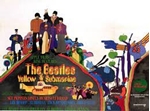
Drug song? Psychedelic whimsy? Or is it just about a submersible vehicle painted in a bright colour? Let’s delve into the mind of Paul McCartney…
53 years ago, The Beatles premiered their psychedelic full-length cartoon feature Yellow Submarine in London. A star-studded affair at The London Pavilion on Wednesday 17 July 1968, The Fab Four took time out from recording "The White Album" to see the film, joined by stars like Rolling Stone Keith Richards, model Twiggy and the first public appearance of Yoko Ono with John Lennon.
But why had The Beatles recorded such a child-like song in the first place? And what were they doing making cartoons anyway?
Source: Radio X
details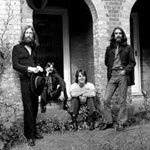
In the history of popular music, no band has had their catalog picked apart to the extent that the Beatles have. Every aspect of every song has been analyzed. From what key the song was written in, to what it was written on, to who wrote it, to where it was recorded. Sometimes, the minutiae of different takes or demos of the same song have been obsessed over. This is just another example of why the Beatles are thought to be the most popular and successful band ever.
According to Far Out, the first song the Beatles ever recorded is a more difficult question to answer than one would think. They booked studio time as early as 1958 while still known as the Quarryman, but their first song recorded by John Lennon, Paul McCartney, George Harrison, and Ringo Starr was "Love Me Do."
Source: Matt Reigle/grunge.com
details
Ron Howard’s “The Beatles: Eight Days A Week – The Touring Years” is based on the early part of the Fab Four’s career (1962-1966), when they first captured the world’s attention.
And along with John Lennon, Paul McCartney, George Harrison and Ringo Starr, it also features a now-familiar face — Sigourney Weaver.
At TheWrap’s Screening Series Thursday night, moderator Steve Pond asked the filmmakers how they spotted the “Alien” actress — who was then just a young Beatles fan — in the crowd at a Hollywood Bowl concert in 1964 or ’65.
The film’s editor Paul Crowder explained — and the story is even more bizarre than you’d imagine.
“We were going through the footage and there is a big party and Groucho Marx gets out of the car and they’re interviewing him and ask him if he’s coming to see the Beatles — Marx is like ‘nah, I’m here to drink,'” Crowder said. “So the cameraman pans around and there were two girls sitting in the car, and I’m like ‘God, that looks like Sigourney Weaver over there.
Source: Umberto Gonzalez/thewrap.com
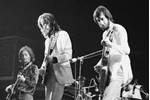
The Who’s Pete Townshend allegedly helped Eric Clapton romance George Harrison‘s first wife, Pattie Boyd. George and Boyd married in 1966, but Clapton fell in love with her shortly after. He needed Townshend to distract the former Beatle so he could sweep Boyd off her feet.
In 1964, George met actor and model Pattie Boyd on the set of The Beatles’ first feature film, A Hard Day’s Night. That first day they met, George asked Boyd to marry him. She declined but agreed to a date. They married in 1966. However, their marriage started to crack in 1970, when George discovered that Clapton loved Boyd.
Clapton met Boyd in London and played her a song he wrote for her. It was called “Layla.”
“We met secretly at a flat in South Kensington,” Boyd said (per New York Post). “Eric had asked me to come because he wanted me to listen to a new number he had written. He switched on the tape machine, turned up the volume and played me the most powerful, moving song I had ever heard. It was ‘Layla.'”
Source: cheatsheet.com

“Did you know,” whispered a pop cognoscente, “that the Beatles invented Scotch and Coke? No one drank it before 1962” A trestle table in the garden of a small chateau, in the hills above Toulon, was appropriately filled with bottles of both – and nothing else. It was just after midnight, the air was thick with the scent of pine, and everyone at the party was being very, very nostalgic. Paul McCartney had not only given his first concert for six years in this obscure and charming place, but actually hadn’t rushed off afterwards, “Ten years …” mused the cognoscente, mixing himself another Beatle Special. McCartney strode jerkily around, shaking hands and looking cheerful, acting as though everything was quite as it always was, that he had not been a hermit from publicity for the last five years (to the extent that rumours swept America that he was dead), and had not been one of the most publicised entertainers in history before that.
Source: Robin Denselow/theguardian.com
details
John Lennon and Yoko Ono were married for over a decade, and the former Beatle said he learned everything from her. He explained that they had a teacher and student relationship, a dynamic he said most people didn’t understand. While Lennon designated the roles, Ono noted that they both learned from each other. They both gave insight into their relationship and what they learned from it.Lennon and Ono met in 1966, when he was still married to his first wife, Cynthia. She had an art installation at a gallery that he went to see.“There was a sign that said, Hammer a nail in, so I said, ‘Can I hammer a nail in?’ But Yoko said no, because the show wasn’t opening until the next day,” Lennon told Playboy in 1980. “But the owner came up and whispered to her, ‘Let him hammer a nail in. You know, he’s a millionaire. He might buy it.’ And so there was this little conference, and finally she said, ‘Okay, you can hammer a nail in for five shillings.’”
Source: cheatsheet.com
details
From teen heart throb to keeping his own heart throbbing, the former Beatle has a fitness routine that is paying great dividends. Here’s the 80-year old’s secret.
There aren’t too many octogenarians headlining high profile rock concerts but Sir Paul McCartney isn't your average 80-year-old. The rock legend recently took to the stage at Glastonbury Festival, one of the world’s biggest contemporary music festivals, and in so doing, became the oldest solo act to headline the festival.
Hey Jude and Let it Be were just a few of the classics he threw himself into – appearing energetic, full of stamina, and with the posture of much younger rockers. So what’s the secret to his vitality? While Paul attributes much of his good health to his vegetarian diet, he also believes his workout routine plays a big role, which he shared on a 2020 episode of the SmartLess podcast.
Source: nationalseniors.com.au
details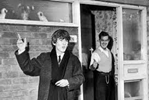
Paul McCartney claimed that after punching a teacher, George Harrison’s father rose to fame at school. Simply because they resembled Teddy Boys, the two teachers of the future Beatles frequently gave them canings. Harold Harrison, however, had some thoughts regarding the way they had hit his son.
George Harrison’s father detested school before he punched his teacher.
George wrote about his experiences with his school in his 1980 memoir, I Me Mine. As soon as he entered grammar school, “the darkness” started.
George wrote, “The whole idea of it was so serious.” “You are not permitted to do this or that, including smiling. You must always take those exams, those eleven-plus exams, or apply for scholarships or GCEs. Be here, stand there, shut up, sit down.
Source: Micheal Kurt/technotrenz.com
details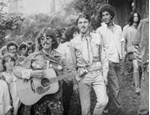
George Harrison traveled to the capital of love, Haight-Ashbury, in San Francisco in 1967. He’d taken LSD two years earlier and wanted to see what the hallucinogen had done for the people there. George expected the hippies to be God-conscious or at least charming artistic beings. He found the opposite. In Here Comes The Sun: The Spiritual And Musical Journey Of George Harrison, Joshua M. Greene wrote, “According to astrological calculation, by 1967 Earth was supposed to be emerging from a thousand years of confusion under the sign of Pisces—two fish swimming in opposite directions—and entering a golden age under the sign of Aquarius.
Source: cheatsheet.com
details
An empty tricycle trailed by a row of small yellow galoshes sits on the concrete floor.
Along the wall, the massive hands of a Blue Meanie hang next to a skirt of mannequin legs.
Round a corner and behold a half-pipe fitted with measuring sticks at the top, guides for roller-skating acrobats to practice their airborne maneuvers.
They’re all part of the glorious mishmash of props stashed backstage at “The Beatles Love by Cirque du Soleil,” a valentine to the Fab Four as much as it is a colorful uplift powered by one of the headiest catalogs in music history.
The trippy, sound-intensive production – three speakers are embedded in every seat headrest – recently celebrated its 16th anniversary, and is currently the fourth longest-running Cirque among the Las Vegas offerings.
The show’s cast and production team hope to build on that tenure, despite some anxieties about the future of “Love.”
Source: usatoday.com
details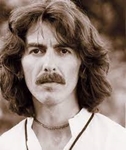
When George Harrison met his wife, Olivia, he’d recently split with his first wife, Pattie Boyd. Before that, George had spent 10 exhausting years with The Beatles, released his mega triple album, All Things Must Pass, planned the first benefit concert, the Concert for Bangladesh, and started his record label. That’s how George met Olivia.
She worked at George’s record label, A&M Records, and often spoke with him over the phone. When George started Dark Horse Records, Olivia transferred over. They met in person and started seeing each other. He invited her to come on his 1974 American tour.
Source: cheatsheet.com
details
George Harrison hated aspects of the material world, including politics, etc. His widow, Olivia, thinks the current state of the world would mortify him. George wouldn’t have gotten too involved. However, he would’ve written songs to be a part of the solution and hoped that politicians would become God-conscious.
It’s been 20 years since George died. One can’t help but wonder what he’d think of everything that’s gone on in the world since his death. In a recent interview with Yahoo Entertainment, Olivia said George would be mortified.
“He would be mortified,” she said. “Dhani and I talk about that a lot: ‘Oh, boy, if Dad was here, he’d just be outraged!'”
However, Olivia can’t deny that George might not have done anything to help but write songs. “But I think now he just might have just decided, ‘You know what? Let’s not give it energy. Let’s just try and be the positive energy.’ He’d be writing songs about it — just trying to be a part of the solution by being his higher self, as opposed to getting down in the hole.”
Source: cheatsheet.com

Ringo Starr revealed the incredible last thing George Harrison said to him on his deathbed in a 2011 documentary. Picture: Grove Street/Spitfire Pictures
Ringo Starr recalled the last ever words his great friend and fellow-Beatle George Harrison said to him in his final days at his home in Switzerland, before his death on November 29, 2001.
Ringo Starr revealed the last thing Beatles' star George Harrison said to him on his deathbed, and it's incredibly moving.
In footage taken from the Martin Scorsese documentary George Harrison: Living in the Material World, Ringo Starr reveals what was said on his last visit to the Beatle star's home in Switzerland.
Source: Giorgina Hamilton/smoothradio.com
details